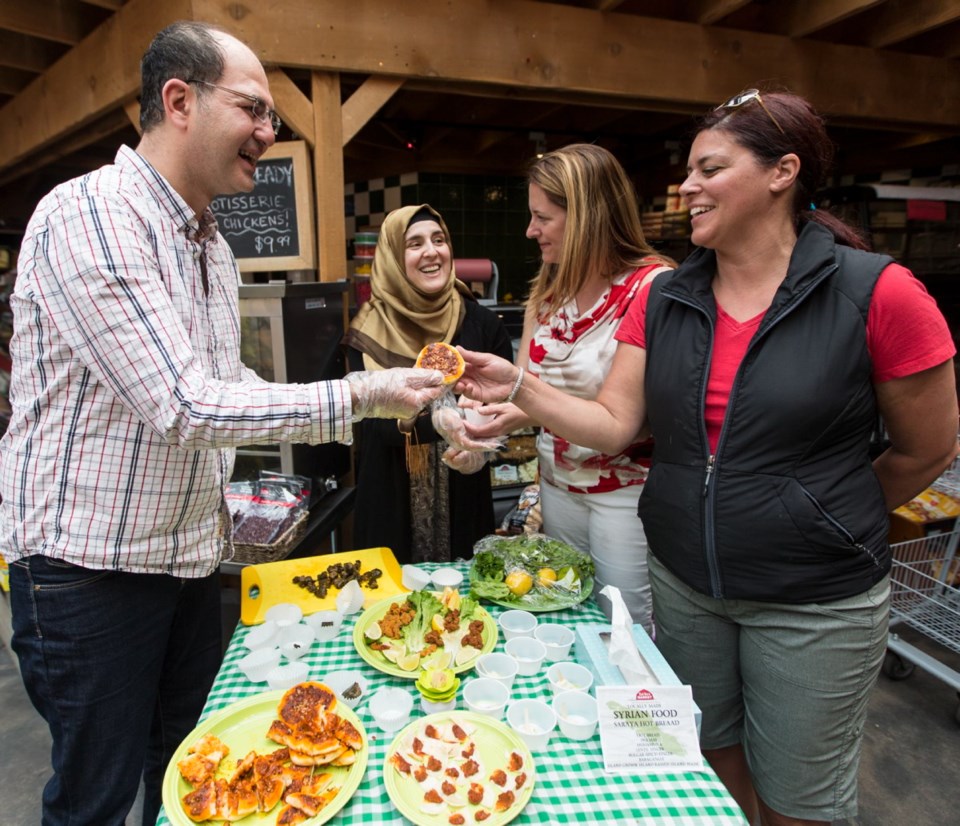Just over a year after they arrived in Victoria, having left everything behind when they fled war-torn Syria, Ibrahim Hajibrahim and his wife, Ranim Khochkar, are the entrepreneurs behind a new Syrian food business.
The couple have put their own twist on traditional Syrian foods and are selling lentil fingers, stuffed hot bread and baba ghanoush out of the Red Barn Market on Oak Bay Avenue. Their products have sold out and tasting demonstrations have earned positive feedback, so Hajibrahim and Khochkar are looking to expand to more Red Barn locations.
“When people support us, it makes us want to work more hard,” Hajibrahim said. “It gives us more hope that we will be successful.”
Saraya Hot Bread is named after Khochkar’s village in Latakia province, which has been destroyed by bombs.
The couple, Hajibrahim’s mother, and their three daughters, Nikar, 9, Limar, 6, Nilay, 3, came to Victoria as refugees in February 2016 after three years waiting in limbo in Lebanon. Their youngest daughter, Aleen, was born here in December.
In January, Ranim cooked dinner for a group of volunteers with the Harbour of Hope Refugee Assistance Society, which helps privately sponsored refugee families.
The guests raved about the food, which gave Hajibrahim the idea to start a restaurant.
“I searched the market and [Victoria] doesn’t have much Syrian food, or not the same quality,” Hajibrahim said.
He floated the idea by Karen Short, a volunteer with the society who has a background in sales. She suggested that selling food to grocery stores might be less expensive than setting up a restaurant.
Short called some contacts and got into touch with Red Barn Market, which kicked off the partnership. Hajibrahim and Khochkar set up a tasting demonstration for Lisa Buchan, the deli director of Red Barn Markets, and she was sold.
Short helped the couple get a business licence and helped them complete the Food Safe program, which is necessary for Island Health certification. The biggest challenge was finding a commercial kitchen, as most charge between $25 and $50 an hour. Hajibrahim ended up finding a restaurant owner who would allow access to his commercial kitchen one day a week for free.
Hajibrahim and Khochkar spent about a month taste testing, experimenting with spices and recipes.
They first supplied to Red Barn’s Victoria location on May 20 and they’ve spent every Saturday and Sunday since giving out samples and talking to customers.
“Most of our food products, they fly,” Hajibrahim said. “People are now asking for our food.”
Brock Smith, professor of entrepreneurship at the University of Victoria’s Gustavson School of Business, said it’s common for immigrants and refugees who are having trouble accessing the traditional job market to set up their own businesses.
“They look at entrepreneurship as a way to generate income to support their families,” Smith said. “The immigrant community is highly motivated. They’ve got skills they’ve honed at home and they’re bringing them to new communities.”
Hajibrahim has been an entrepreneur before, running a well-established pharmacy in Syria.
“He’s been a business owner, he gets it,” Short said. “He just needed some help navigating his way.”
Hajibrahim would like to get back to working as a pharmacist, but he needs to improve his English on a technical level, which could take a few more years.
During the war, Hajibrahim turned his home into a makeshift clinic to treat wounded rebel fighters so they could avoid government-controlled hospitals.
When he heard he was wanted for questioning about why he was taking more medical supplies than would be needed for his pharmacy, he knew he had to flee. Government forces also knew Hajibrahim was the son of a pro-democracy activist, who was jailed for four years because of his political views.
The family fled to Turkey and Hajibrahim’s sister, Faeza, who was already living in Victoria, began the process for family reunification.
Hajibrahim said the process was dragging along, but on Sept. 2, 2015, when the photo of three-year-old Alan Kurdi’s lifeless body on a Turkish beach was seen around the world, attitudes began to shift.
Pro-refugees rallies that took place in major cities around the world put pressure on politicians to do more to help Syrian migrants fleeing the war.
Prime Minister Justin Trudeau committed to taking in 25,000 Syrian refugees, who started arriving in December 2015. Suddenly, the family’s application moved at lightning speed.
Hajibrahim said his family owes their new life to Alan. That’s why he named his six-month-old daughter Aleen.
The Harbour of Hope Refugee Assistance Society is working to sponsor Hajibrahim’s sister and her family.
Hajibrahim said that through his business, he wants to give his family a good and stable life in Canada. “It gives you a sense that you’re part of this community and part of this new home.”



